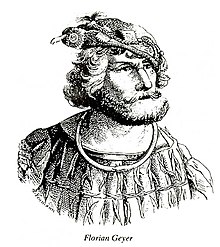Geier (surname)
German migrants to English-speaking countries often Anglicize Geier as Geyer, though this change has become less common in recent years.
Similarly, Geier has often been mistakenly changed to Geyer, and vice versa in legal papers such as birth certificates and migration documents, especially in areas where the name is uncommon, or one version is vastly prevalent.
The Yiddish word geyer means "peddler", and it is assumed that when last names became mandatory in Europe, the surname Geier was imposed upon Jewish peasants as a deprecatory label connoting a scheming merchant who takes advantage of the cupidity of others, i.e., a "vulture".
[3][4] In modern times, it is not unusual for the vulture in family coats of arms or logos to be rendered as a comical caricature of a slumping and sad-sack buzzard rather than a lammergeier or gyrfalcon with "the bearing of an eagle".
The heraldic coat of arms of the Geyer family in Giebelstadt was not a vulture or an eagle; instead, it originally was a horse, and later became a ram in the latter part of the 17th century.
The plaintiff was a child named Alexis Geier who had been seriously injured in an accident while riding with her parents in a Honda passenger vehicle equipped with seat belts but not airbags.
The Supreme Court held that Ms. Geier could not sue Honda for failing to install airbags in a vehicle sold in 1987 because at that time, only seatbelts were required by federal law.
She sued on behalf of herself and others in a class action to compel the State of Tennessee to end its de facto operation of a dual post-secondary education system for white and non-white students.
The case had a tortuous history as the United States Government and a number of other plaintiffs joined in support of her position, and involved at least a dozen reported appellate court decisions, including Geier v. Sundquist, 94 F.3d 644 (6th Cir.
The family associated with Lynn Township in McLeod County and with Boon Lake Township and other parts of Renville County is entirely descended from a single immigrant from Woldegk, Germany, by the name of Ferdinand Theodore Geier, a/k/a Ted Geier, who arrived in Minnesota in 1880 after spending 10 years as a wheelwright and truck farmer in Chicago, Illinois and nearby Cicero, Illinois.
